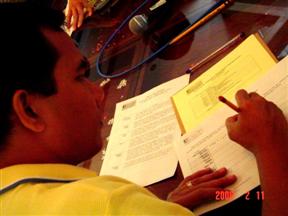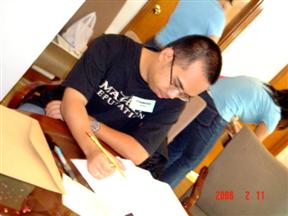Yesterday (February 11, 2006), the
1st Batch of Theo Philo faculty members (click here to view pictures) had the
"1st Reflective Inquiry on LC Teaching Beliefs and Practices". This initiative was undertaken in close collaboration with the CLCIR being spearheaded by Ms. Marissa Rodriguez.

The purpose of such an activity is to inquire on how LC the participants are in terms of their teaching beliefs and practices and eventually recommend specific course of actions based on the results and findings of the said inquiry.
What is a Reflective Inquiry?Inquiry as a method encourages and enhances thinking. Critical Thinking as a process constructs meaning and confirms understanding. Reflective Inquiry is where critical thinking integrates the reflective and shared activities of a community of inquiry. Thus, inquiry and reflective thought are conjoined (Garrison, 2004).
An inquiry learning experience (1) is problem or question driven, (2) typically has a small-group feature, (3) includes critical discourse, (4) requires self-direction, (5) is frequently multi-disciplinary, and (6) incorporates research methods such as information gathering and synthesis of ideas” (Institutional Learning Plan, 2003 as cited in Garrison, 2004).
Garrison (2004) describes Critical Thinking as, "(1) the means to personal meaning, (2) (re)construction of knowledge, and (3) an educated person. The addition of the adjective – critical – reflects the essential element of questioning and skepticism. To think critically is to make sense of things through questioning, debate, and confirming understanding collaboratively."
In terms of its educational implication, Garrison (2004) claims that, "thinking does not occur in a vacuum; it is thinking about something." Thinking is best taught as (1) an integral aspect of a course of studies and (2) acquiring a deep understanding of specific content. Reflective inquiry is seriously compromised by an excessive emphasis on content (Donald, 2002 as cited in Garrison, 2004). That is, teaching of thinking must occur in concert with the teaching of content (Garrison, 2004).
What are the results and findings of the Inquiry?
The wealth of data drawn from the SMS -Theo Philo Area participants through their surveys, reflections, discussions and recommendations will be collected in a systematic manner so that results and findings of the said activity can be strongly validated and supported through and by other sources or data from other areas within SMS or other schools in the College.
Painter & Rigsby (2005) provide below these two phases of the said activity, namely (1) data gathering through Reflective Inquiry and (2) the course of actions or the products produced based on the results and findings of the inquiry.

Reflective Inquiry: - Teacher thinks about why he/she "does something in a certain manner" and talks about how to improve.
- Has a central question that is being explored; Q. remains static throughout project.
- Teacher uses journal to write reflectively and collects some data systematically.
- Teacher has gotten feedback from others to refine his/her inquiry. But. generally, does not systematically consult to get other perspectives
- The subjectivity of the view is checked by only a few types of data
- Researcher begins to show how research is tied to others' research
Product Produced: - Improved classroom practice/new teaching techniques
- Reflective writing may be sculpted into a short essay with some back-up evidence.
- Contains findings that can be backed up by some evidence.
- Presentation story: Tells a personal story that is backed up by some specific pieces of evidence about how to improve teaching practice.
The Participants: - ABRENICA, VICENTE E.
- ANTONIO, GLORIA M.
- BENTER, GENEROSO L.
- CASTILLANES, OSIAS G.
- DACANAY, DARY E.
- ESPINOSA, JULIUS R.
- FABULA, JENNIFER BUYA
- IMBONG, JERRY D.
- INGLES, ANTONIO LEVY JR. S.
- MACARANAS, JUAN RAFAEL G.
- MANALOTO, RAMON V.
- MATURAN, DENNIS RAYMUND P.
- NAMOC, WILBERT AURNER B.
- ORIBE, MELCHOR A.
- SANCHEZ, FREDERICK D.
- ZABALA, ALBERT HERMOGENES S.
- YAP JR., RUDOLPH D.
References:Garrison, D. R. (2004). Inquiry and critical Thinking-reflective inquiry. Retrieved February 12, 2006, from Web Site: http://commons.ucalgary.ca/documents/ReflectiveInquiry.pdf
Painter, D. & Rigsby, L. (2005). Comparing teacher research to other forms of professional development. Retrieved February 12, 2006, from Web Site: http://gse.gmu.edu/research/tr/TRprofessional.shtm


1 comment:
I'm pleased that you blogged about this activity,bro. Let's hope this is the start of more reflective discourses among faculty.
Post a Comment